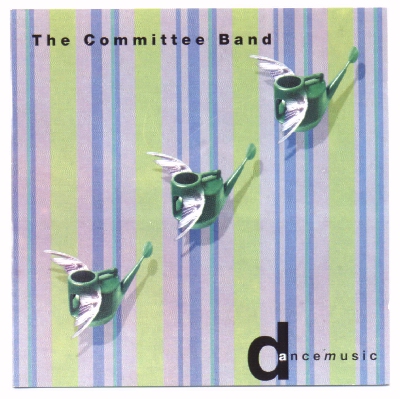
Dancemusic

Track Listing
Dancemusic: tunes from all over the place, which we play for English country dancing. We mostly started playing traditional English music, but over the years we’ve picked up tunes from farther afield - if it’s a good tune we’ll use it. Although we can’t remember where we got them all from, here’s what we think:
1. Half hannekin / The Pantheon cottillon Intro + 32 bar jig x 7
Two English jigs. The first is in John Playford’s The English dancing master. The second is from Matt Seattle’s edition of Bewick’s pipe tunes; it originally had a third part which we don’t use.
2. Lucerne / Lulu polka Intro + 32 bar polka x 8
A pair of Swiss-sounding polkas. Lulu was found in Kerr’s fourth collection of merry melodies, and while trying to find a tune to go with it Diane remembered Lucerne from primary school. We did consider adding yodels and cuckoo noises to Lucerne, but decided this was too tasteless even for us.
3. Muineira sul sacrato della chiesa Intro + 48 bar jig x 5
A Galician 48-bar jig (which translates as Jig danced on the church square) played on Celtic Hotel by the Battlefield Band, who put the weird chords in the B part. We've also found it under another name (Muineira de Cabanas) which may or may not be more authentic.
4. Serpentiner och konfetti 32 bar hopstep x 6
A terrific reinlander by Mats Edén of the Swedish group Groupa, which can be heard on their record Vildhonung. Thanks to Scandophile Ralph Jordan for introducing us to this one, and Mats for allowing us to anglicise it.
5. Mike Mullin's / Curenta (Monfrina de Marcèlo 1 / Curenta dei butei) Intro + 32 bar jig x 9
The first of these monferrine is a carnival dance tune learned in Ponte Caffaro in the Lombardian Alps; it can be heard played by the carnival musicians on their CD Pas en amùr. Not knowing its name at the time, we christened it Mike Mullin's farewell to his breakfast for reasons which we won't go into here. Curenta is from Piedmont and is played by La Ciapa Rusa on Ten da chent d’archët che la sunada l’è longa. Thanks ciaps.
6. 'Ere You (Yrjö Holmin polka) Intro + 32 bar polka x 7
A fast polka from the Danish CD Traditional arranged by Dronningens Livstykke (which name allegedly means "an intimate piece of the Queen's clothing for keeping the lower regions of the stomach nicely warm in winter"), who found this Finnish tune in Sweden. You can't get much more Nordic than that.
7. Sarah’s jig / Hilda’s hard one Intro + 32 bar jig x 9
Sarah's jig was written by Ian while watching his three-year-old daughter dancing. It turned out to go well with Hilda's hard one, written by Hilda in G minor and then named after the saxophone implications of transposing it to E minor.
8.. Four-hand reel / La Bastringue Intro + 32 bar reel x 8
Many versions of the Four-hand reel have been collected in Dorset and elsewhere. La Bastringue is deservedly one of the most widely played French-Canadian reels which we think was picked up in the Radway Inn at Sidmouth, but the classic recorded version is probably that of Philippe Bruneau on Dances pour vielles Canadiennes.
9. Vuoma-Pertti’s mazurka Intro + 32 bars waltz x 6
From På bar gärning by Kangas Spelemän from Finland. If our uneducated attempt at translation is correct, this mazurka comes from Pertti Vuomajärvi, one of the great old Lapp melodeon players who was born in 1894. This extra-sleazy tune is usually used for Gordon's extra-sleazy dance Rozsa.
10. Mad Moll of the Cheshire hunts / Enrico Intro + 32 bar hopstep x 8
Two well-known English tunes, played as hopsteps. Mad Moll was collected by Cecil Sharp from John Locke of Leominster and is published in John Kirkpatrick and Sue Harris’s collection Opus pocus. Enrico is from the Hardy family manuscript Tunes for the violin and is published in Joan Brocklebank’s collection The Dorchester hornpipe.
11. Guy's tunes (Schottis från Idre / Schottis från Härjedalen) 32 bar schottische x 10
Two Swedish schottisches picked up from Guy Crayford in Dave Roberts' kitchen and from other sources, and also printed in Kitty Halcrow and Charles Saksena’s Fiddle music from northern lands. The essential off-beat "clonk" in the second tune is a cowbell, because we couldn’t get two oiled strongmen with sledgehammers into the studio.
12. Tarantella Intro + 48 bar jig x 6
Probably the most famous Italian tarantella, played in the wedding scene in Prizzi’s honor. In England it’s usually played with two parts, but a couple of years ago Tony heard a four-part version on a supermarket TV ad involving chickens; we didn't really like one of the extra parts so we now play it as a three-part tune.
The CD was recorded at Woodworm Studios, Barford St Michael, Oxfordshire in March 1997. It was engineered by Mark Tucker, and was produced, mixed and edited by Martin Appleby.